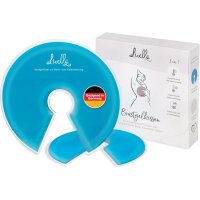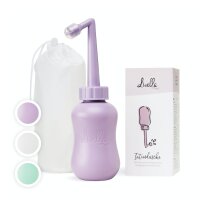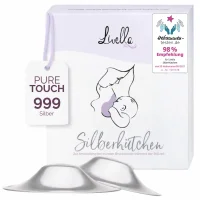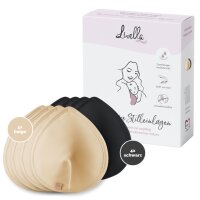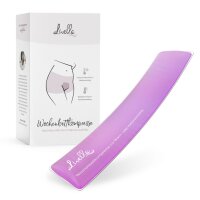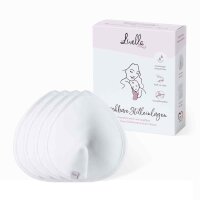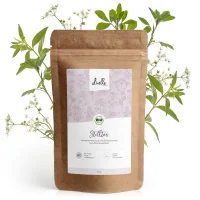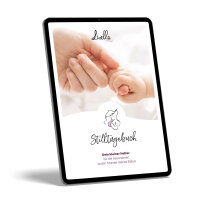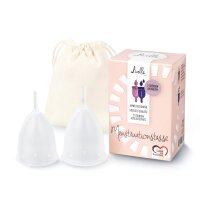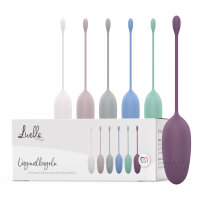Healthy eating is a must all the way through pregnancy. Even if there isn’t much visible evidence in the first few months, there’s a lot happening in your body that requires plenty of energy and a good supply of nutrients.
Which nutrients are needed for a healthy pregnancy diet? Which dietary supplements are recommended for pregnant women? Why is a healthy diet important during pregnancy? What does a healthy, balanced pregnancy diet plan look like?
Table of contents
Eating a healthy pregnancy diet: important nutrients
Healthy eating during pregnancy: what to include in your pregnancy diet plan
The best tips for a healthy pregnancy diet
Healthy pregnancy diet: key takeaways
Eating a healthy pregnancy diet: important nutrients
During pregnancy, the body’s nutritional needs increase. This includes a sufficient intake of certain vitamins, minerals and trace elements which are needed to ensure a healthy development of the baby and to support the mother’s health. That’s why mums-to-be need to pay special attention to their pregnancy diet.
Nutrients that are needed in larger quantities than usual during pregnancy include iodine, iron, folic acid and docosahexaenoic acid (DHA). Here is an overview of the different body functions and processes these nutrients are involved in.
- Iron: Iron is involved in the transport of oxygen to the cells and is also needed for the formation of red blood cells. During pregnancy, the trace element plays a key role in the development of the placenta and uterus. An iron deficiency during pregnancy increases the risk of premature birth and can lead to delayed growth and development in the first years of life. Low maternal iron levels can further have a negative effect on the development of the baby’s immune system.
- Folic acid: The B vitamin is needed for cell growth and cell division processes in the body. Folic acid deficiency in pregnancy can lead to several malformations in the baby, including a neural tube defect.
- Iodine: Iodine is vital for the human body. It is needed for the formation of thyroid hormones and is further involved in cell growth and energy metabolism, among other things. The trace element is also crucial for the healthy development of the baby's body, brain and nervous system. An iodine deficiency in pregnancy should be avoided at all costs.
- Docosahexaenoic acid (DHA): DHA is an omega-3 fatty acid that is needed for a healthy brain function and also plays an important role for eye health, among other things. Since DHA is crucial for the development of the baby's brain and nervous system, future mums should make sure to consume enough omega-3 fatty acids during pregnancy.
Eating a healthy diet during pregnancy is essential for ensuring a sufficient intake of iron, iodine, DHA and folic acid. In order to cover the body’s increased nutritional needs, a healthy pregnancy diet plan should include the following foods.
- Foods that are rich in folic acid: egg yolk, soft cheese, quark, tuna, green leafy vegetables, pulses, nuts, wholemeal bread, lamb's lettuce, strawberries, tomatoes, peppers, sour cherries, whole milk, breakfast cereals enriched with folic acid, dairy products and soft drinks
- Foods that are rich in iodine: iodised salt, seafood (e. g. crabs), milk and dairy products, eggs (depending on how the animals are fed), spinach, meat products with added iodised salt, sea fish (e. g. saithe and cod - avoid raw or undercooked fish)
- Foods that are rich in iron: red meat, fish (avoid fish that are not safe to eat during pregnancy), eggs, cereals, nuts, pulses such as chickpeas and green peas, green vegetables such as spinach and kale, seeds and wholemeal products
- Foods that are rich in DHA: primarily oily sea fish such as tuna, mackerel, herring, sardines or salmon
In addition to eating a healthy pregnancy diet, it’s recommended that pregnant women take different nutritional supplements to prevent nutrient deficiencies that could adversely affect the baby’s healthy development. Here is an overview of the standard recommendations for mums-to-be:
- Iodine supplements: The general recommendation is that pregnant women should supplement 100 to 150 micrograms of iodine per day. However, iodine supplementation should always be discussed with a GP or dietitian first to avoid taking too much iodine.
- Folic acid supplements: Women should start supplementing folic acid at least four weeks before pregnancy. Folic acid supplementation should continue throughout the first pregnancy trimester. The recommended daily dose is 400 micrograms of folic acid per day.
Iron supplements, on the other hand, are only prescribed if the mother’s haemoglobin level (Hb) is found to be too low during one of the antenatal appointments. The consumption of other dietary supplements should also be discussed with a GP or midwife.
If you don’t want to eat oily sea fish during pregnancy, you should cover your omega-3 fatty acid requirements, especially DHA, with appropriate food supplements or with foods that are enriched with DHA. The general recommendation for pregnant women is a minimum of 200 mg DHA per day (either from food or supplements).
Good to know: A woman’s body also needs more folic acid, iodine and iron while breastfeeding. That’s why it’s also important to eat a healthy breastfeeding diet.
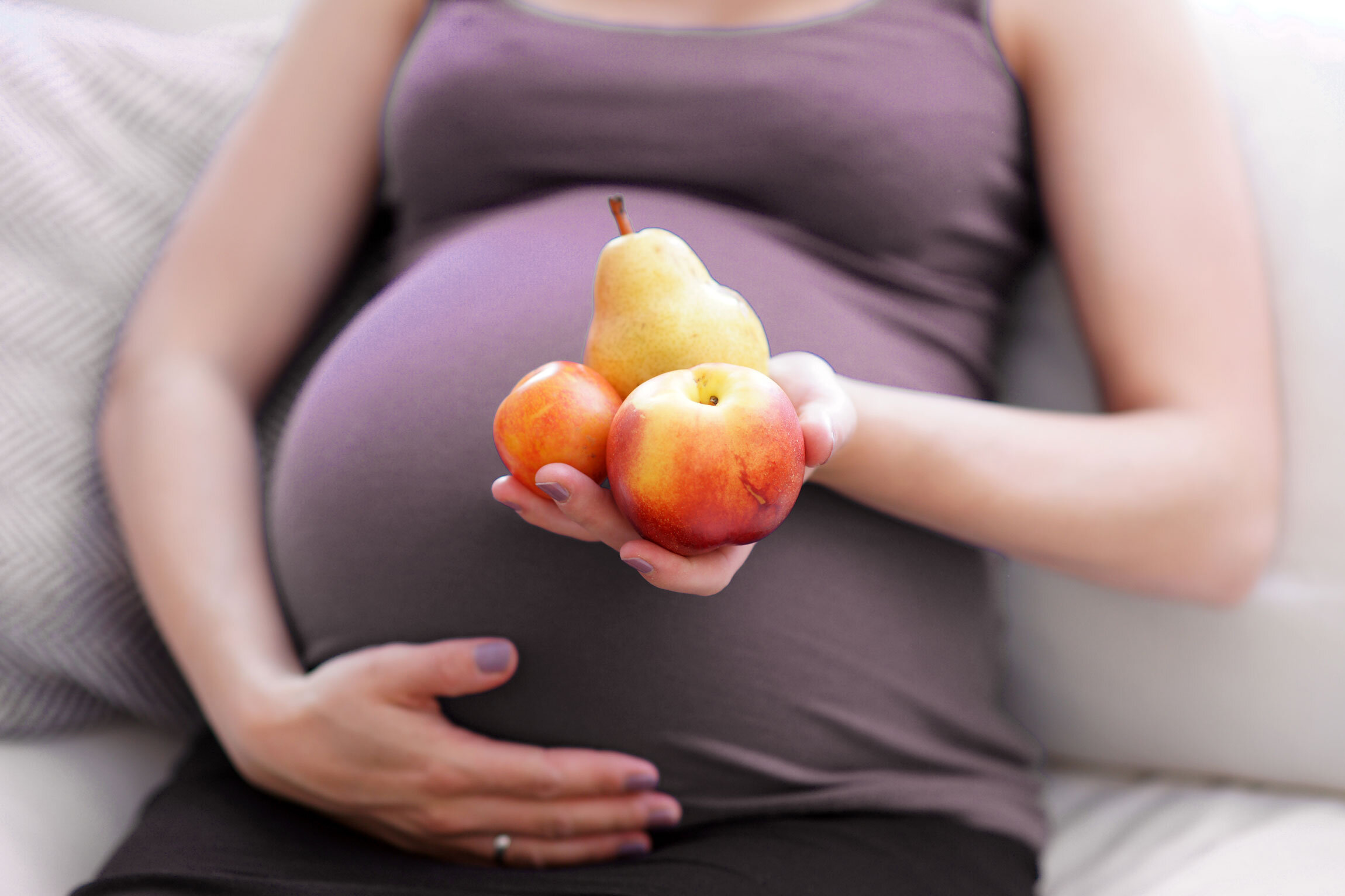
Healthy eating during pregnancy: what to include in your pregnancy diet plan
Now that we know what nutrients are important during pregnancy, the next question to answer is: What's a healthy diet for pregnancy? To make sure that your body receives all the important nutrients it needs, you should follow a healthy pregnancy diet plan.
Here are some guidelines for healthy eating during pregnancy:
- Eat five portions of a variety of fruit and vegetables every day.
- Include three portions of dairy products (e. g. a glass of milk, a slice of cheese and a cup of yoghurt) in your daily diet.
- Consume one to two portions of fatty sea fish per week.
- Eat one to two portions (around 300 g) of lean meat per week.
- Include additional animal products (e. g. eggs), but don’t overdo it.
- Eat lots of plant-based foods like pulses and wholemeal products.
- Drink at least 1.5 to 2 litres of water or other unsweetened drinks per day.
- Prefer vegetable oils, such as olive oil, which contain unsaturated fatty acids.
There are many different recipes for a healthy pregnancy diet. Here are some ideas on what to eat for breakfast, lunch, dinner and snacks during pregnancy:
- Breakfast: muesli with quark or yoghurt and fresh fruit
- Lunch: steamed fish fillet with grilled vegetables and potatoes
- Dinner: a slice of wholemeal bread with cheese and tomato or cucumber
- Snacks: raw vegetables with herbal quark, small salad with seeds
The best tips for a healthy pregnancy diet
Future mums often have a myriad of questions when it comes to eating a healthy pregnancy diet. What diet is best for pregnancy? Which foods should be avoided during pregnancy? Is it possible to follow a vegan or vegetarian diet during pregnancy?
Here are a few helpful tips and guidelines you can follow:
- Vegetarian or vegan diet during pregnancy: Pregnant women who follow a vegetarian or vegan diet need to pay special attention to what they eat during pregnancy to cover their nutritional needs. Vegetarian mums-to-be might have to take iron supplements. For mums-to-be who are vegan, on the other hand, there is practically no way around taking dietary supplements. In any case, it’s recommended to consult a GP or dietitian to ensure a sufficient nutrient intake.
- Wholesome, high in fibre and varied: These are the three guiding principles you should follow when it comes to your pregnancy diet. Prefer complex carbohydrates and eat lots of fruit and veg, wholegrain products and protein-rich dairy products.
- No need to eat for two: It’s a common misbelief that pregnant women need to eat for two. Eating more than you need will only lead to excessive weight gain in pregnancy. Your body needs way fewer calories to grow a baby than are needed to supply the body of a fully grown adult. Eating too much during pregnancy increases the risk for the baby to have a high birth weight and to become overweight in later years of life. That’s why you should rather focus on quality instead of quantity when it comes to your pregnancy diet plan.
- Avoid foods that aren’t good for you and your baby: There are certain foods that are best avoided during pregnancy. They include raw milk products, raw meat and cold cuts, raw fish, smoked fish, raw eggs, unwashed fruit and vegetables and alcohol. Sweets and ready meals that contain many additives and saturated fatty acids should also be avoided.
- Prefer plant-based fats: Your pregnancy diet should be low in fat, which is why you should try to avoid convenience foods or processed products such as cold cuts and desserts. Any fats you consume should be from plant-based sources because they also contain the vitamins A and E. Animal products should be low in fat if possible. The exception is sea fish because it provides valuable omega-3 fatty acids.
- Eat more carbohydrates: During the second half of pregnancy, the body needs around 200 to 300 calories more per day. In order to cover your increased energy intake requirements, you should eat more carbohydrates. Wholegrain products and potatoes are good, healthy sources of energy.
- Increase your protein intake: Make sure to include plenty of protein in your pregnancy diet. Proteins are essential for the development of the muscles and organs in your baby’s body. Recommended sources of protein include pulses, dairy products and lean meat.
- Ideally five to six small meals per day: It’s recommended that pregnant women eat five to six smaller meals throughout the day, instead of three big meals. This not only helps prevent fluctuations in blood sugar levels but also helps fight sickness and nausea.
- Get advice from your GP or midwife: Your GP or midwife can provide professional support with regard to nutrition and diet during pregnancy. You should receive detailed information on what to eat and what not to eat during pregnancy during your antenatal appointments.
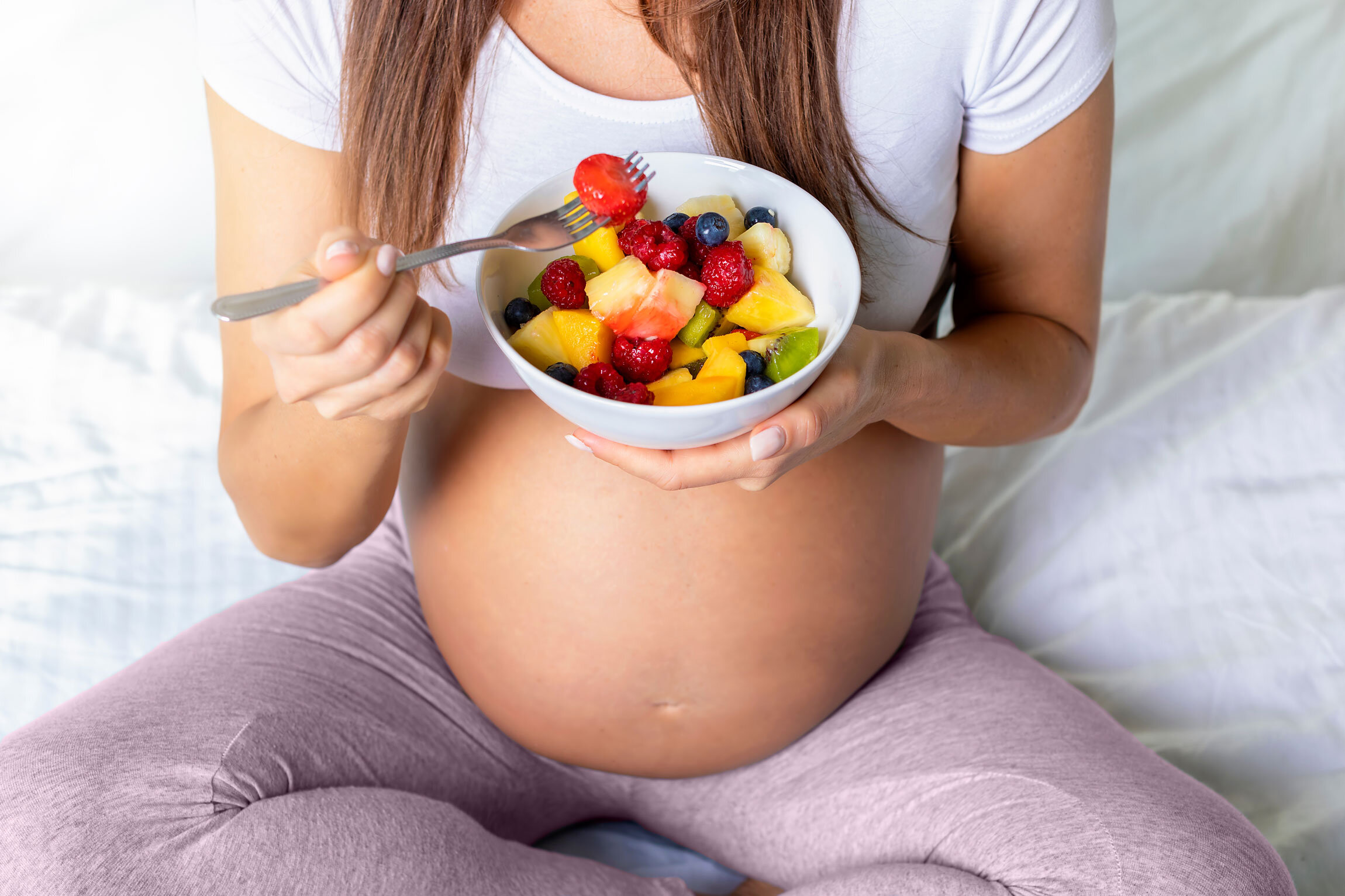
Healthy pregnancy diet: key takeaways
A healthy pregnancy diet is key for ensuring the health of mother and baby. So, what to eat when pregnant? Here are the key takeaways at a glance.
- During pregnancy, the body has an increased need for certain nutrients, including iron, iodine, folic acid and DHA.
- Mums-to-be need to be careful about what foods to include in their pregnancy diet. It’s further recommended that pregnant women supplement folic acid. The need for iodine supplements should be discussed with a GP, dietitian or midwife.
- A healthy pregnancy diet should include plenty of fruit and vegetables, protein-rich foods, wholemeal products and unsweetened drinks.
- It’s preferable to eat five to six smaller meals throughout the day.
- There is no scientific justification for eating for two. Eating more than is needed only leads to excessive pregnancy weight gain.
References
- Rundum - Schwangerschaft und Geburt - BZgA Shop
- Gesunde Ernährung in der Schwangerschaft | Die Techniker (tk.de)
- Ernährung in der Schwangerschaft: Für das Leben des Kindes prägend (aerzteblatt.de)
- Versorgung mit Omega-3-Fettsäuren in der Schwangerschaft- Gesund ins Leben (gesund-ins-leben.de)
- Essen und Trinken in der Schwangerschaft- Gesund ins Leben (gesund-ins-leben.de)
- Handlungsempfehlungen - Ernährung in der Schwangerschaft | DGE
- Jodmangel in der Schwangerschaft
- Folsäuremangel in der Schwangerschaft
- Eisenmangel in der Schwangerschaft


